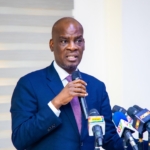
Education Minister Haruna Iddrisu has reaffirmed government’s commitment to protecting the religious rights of all students in Ghana, including Muslim students currently at the centre of a legal challenge involving Wesley Girls’ High School.
Speaking on the floor of Parliament on Tuesday, November 25, he addressed concerns over alleged restrictions placed on Muslim students at the school, restrictions that are now the subject of a Supreme Court case.
“There is ongoing debate on restrictions on Muslim students in Wesley Girls’, which conflict with international human rights standards and with the expectations of Ghana’s Constitution, particularly Articles 33(5) and 26(1),” Mr Iddrisu said.
He stated that government has an obligation to safeguard the rights of every student, regardless of religion.
“We have a duty to uphold the rights of every Ghanaian child and every Ghanaian citizen. No right is divisible, and we will not countenance any action by any person that denies any Ghanaian girl the opportunity to profess or practice any religion,” he added.
Meanwhile, the Supreme Court has granted Democracy Hub leave to file a written address as a friend of the court (amicus curiae) in the high-profile case challenging religious discrimination policies at Wesley Girls’ Senior High School.
In its ruling on Tuesday, the court also ordered the school, GES and the Attorney-General to file their responses to the plaintiff’s action.
The Attorney-General, in its defence, on behalf of Wesley Girls SHS and the Ghana Education Service, insisted that the school, founded and run by the Methodist Church, has the right to preserve its denominational identity.
Background
The ongoing debate stems from a suit filed on December 24, 2024, by private legal practitioner Shafic Osman, who is invoking the original jurisdiction of the Supreme Court under Articles 2(1)(b) and 130(1)(a) of the 1992 Constitution.
The suit challenges Wesley Girls’ policies, which allegedly prevent Muslim students from wearing the hijab, fasting during Ramadan, and participating in other Islamic religious practices.
Mr Osman argues that these restrictions violate constitutional guarantees, including freedom of religion, equality before the law, and protection from discrimination.
